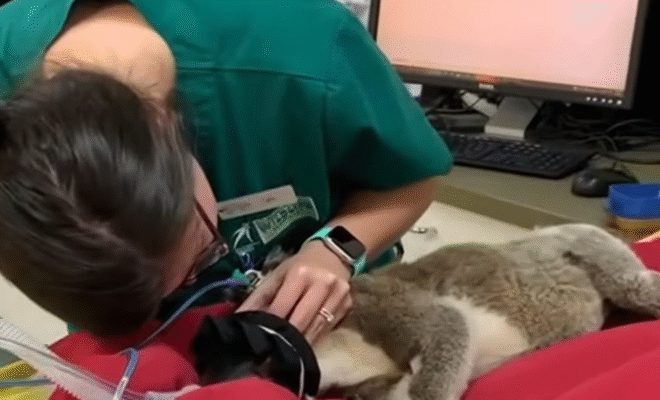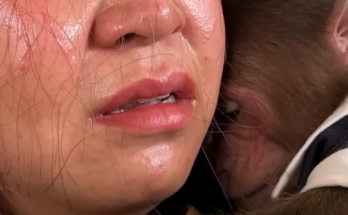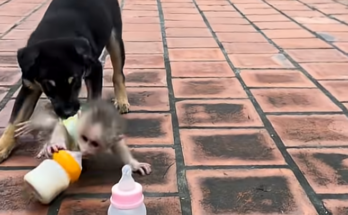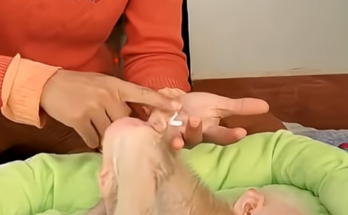It was a warm afternoon in the Australian countryside. The sun was shining through the eucalyptus trees, casting dancing patterns of light onto the ground. A gentle breeze rustled the leaves, carrying with it the fresh scent of nature. By the edge of a large lake, life was peaceful and quiet, except for the occasional birdsong and the soft hum of insects.
Near the lake, a curious young koala had been exploring. Unlike most koalas, which prefer to stay high up in the safety of the trees, this one had wandered down to the water’s edge. Perhaps it was thirsty, or perhaps it was simply curious about the strange rippling surface of the lake. The little koala reached out a paw to touch the water. Suddenly, a loose patch of mud gave way beneath its feet.
Splash!
The koala tumbled into the lake with a surprised cry. Koalas are not natural swimmers, and this one began to panic immediately. It flailed its arms, struggling to stay afloat. The surface of the water rippled as the animal tried desperately to hold its head above the waterline.
Fortunately, not far from the lake, a family was picnicking under the shade of a big gum tree. They heard the splash and the frightened cries of the koala. The father, John, looked up and saw the small animal struggling in the water.
“Look! That koala is drowning!” John exclaimed, leaping to his feet.
His wife, Sarah, gasped and held their daughter, Lily, close. “Oh no, someone needs to help it! It won’t last long!”

Without hesitation, John kicked off his shoes and ran toward the lake. The muddy bank was slippery, but he didn’t care. He knew every second counted. Koalas, although strong climbers, are not built for swimming, and their heavy fur quickly becomes soaked and weighs them down.
“Stay back, Lily! Daddy will help the koala!” Sarah reassured their little girl.
John jumped into the water. The lake was colder than expected, but adrenaline kept him going. He swam quickly toward the struggling animal. The koala, frightened and exhausted, clawed at the water, unaware that help was coming.
When John reached it, he moved slowly and carefully. Koalas have sharp claws, and a panicked animal might accidentally scratch or hurt its rescuer. “Easy there, little one… I’m here to help,” John said softly, keeping his voice calm.
The koala turned its head, eyes wide with fear, but as John gently scooped it up, it clung to his arm. Its claws dug into his shirt, but he didn’t mind. He held the koala close, keeping its head above the water as he swam back to shore.
On the bank, Sarah and Lily cheered. “You’ve got it, Dad!” Lily shouted, clapping her hands.
When John reached the shore, Sarah helped him out of the water. Together, they wrapped the soaked koala in a towel from their picnic basket. The little animal trembled, but it seemed relieved to be safe. Its round, fluffy ears twitched as it looked at the family with curious, grateful eyes.

“Poor thing… it must have been so scared,” Sarah said softly, stroking the wet fur.
Lily knelt beside the koala. “Can we keep it, Mommy?” she asked hopefully.
John chuckled. “Koalas belong in the wild, sweetheart. But we can help this one until it’s strong again.”
The family placed the koala in a shaded spot near their picnic blanket and gave it some fresh water. It sipped carefully, still shaking a little from the ordeal. John used another towel to gently dry its fur.
Soon, another family picnicking nearby came over. They had seen the rescue and brought some eucalyptus leaves they had collected from the trees. “Koalas love these,” one of them said.
Approaching the cub wasn’t easy. They knew that if the mother was still alive, she would not tolerate humans near her baby. But after carefully observing the area for hours, it became clear that Leo was alone. His frail body told them he had not eaten in days. Samuel slowly crouched down and extended his hand. At first, Leo growled, his tiny voice filled with fear. But when Samuel gently offered a warm blanket, the cub, too weak to resist, allowed himself to be picked up.
The team quickly transported Leo to their rescue center. There, under the care of veterinarians, he was fed warm milk from a bottle and wrapped in soft towels to keep him warm. At first, he was too weak to drink, but with patience and gentle coaxing, he began to regain strength. The staff marveled at his resilience. “He’s a fighter,” one of them said, smiling as the little cub blinked up at them with trusting eyes.
Yet, caring for a lion cub was no small task. Lions are social animals, and young cubs need not just food but love and companionship. Without his mother’s presence, Leo could have grown up shy and fearful. The rescue center made a bold decision: they would introduce him to another lioness, one who had lost her own cubs due to illness just weeks earlier.
The lioness, named Nala, was initially cautious. She sniffed the little cub with suspicion, her golden eyes watchful. The team held their breath. Would she accept him, or would she reject him as a stranger? For a tense moment, Nala stepped back. Then, as if sensing Leo’s need for a mother, she lay down and let out a low, comforting purr. Leo, instinctively, nuzzled into her fur. A new bond was formed that day—one of love and adoption.
Under Nala’s care, Leo thrived. She groomed him, played with him, and taught him the ways of the jungle, just as his real mother would have. The staff at the rescue center watched in awe as Leo transformed from a weak, frightened cub into a playful, adventurous little lion. His coat grew thick and shiny, his energy returned, and his mischievous personality began to shine through. He would pounce on Nala’s tail, roll in the grass, and chase after butterflies with boundless joy.
Samuel, who had found Leo, visited the pair every day. He often sat outside the enclosure, watching them play, and felt a deep connection to the cub. “He’s not just surviving,” Samuel said to his team one afternoon, “he’s learning to be a lion again.”
The story of Leo’s rescue spread across the local community. Children came to see the cub and learn about the importance of protecting wildlife. Many were moved by the idea that even in the wild, where survival is often harsh, there is room for compassion and second chances. Leo’s journey became a symbol of hope.
As months passed, Leo grew stronger and bigger. The time came when the rescue team had to think about his future. They knew that a lion’s true home is in the wild, not in captivity. Slowly, they began preparing both Leo and Nala for life back in the jungle. They were moved to a larger, semi-wild enclosure where they could learn to hunt and live as they would in their natural habitat.
The first time Leo caught a small animal on his own, the entire team cheered. It was a sign that he was ready to take his place in the wild. Yet, for Samuel and the others, the thought of letting him go was bittersweet. They had grown attached to the little cub who had once fit in the palm of Samuel’s hands.
The day of release came at dawn. The sky was painted with hues of orange and gold, as if nature itself was celebrating. The gate of the enclosure was opened, and Nala stepped out first, her strong figure leading the way. Leo followed closely behind, his golden coat gleaming in the morning light. For a moment, he turned his head, as if to look back at the humans who had saved him. Samuel raised his hand in a silent goodbye.
Then, with a leap, Leo ran into the jungle, his new home. He was no longer the lost, helpless cub. He was a young lion, ready to embrace the wild with courage and strength.
The story of Leo and Nala reminds us that life, even in its harshest moments, can offer unexpected kindness. A motherless cub found love again, and through the efforts of caring humans and the heart of a grieving lioness, he was given a future. In the jungle, where every creature fights for survival, the tale of adoption and second chances shines like a ray of hope.



